Links
Center
Field
Love
of the Game
Timeline
Today
CF
Media
E-mail |

The summer of 1997 in sports

BY NATHAN BIERMA
Winner of the 1998 Grand Rapids Christian High School Fine Arts Award for Narrative Essay
At the time, of course,
it didn't seem the least bit ironic
that Van Halen's "Standing On
Top Of The World" was among the
songs blaring over the Joe Louis
Arena loudspeaker in Detroit
that warm June night.
After all, the Detroit Red Wings had just
won the Stanley Cup for
the first time in 42 years, and the
songs' title appropriately
described the teams' status after it
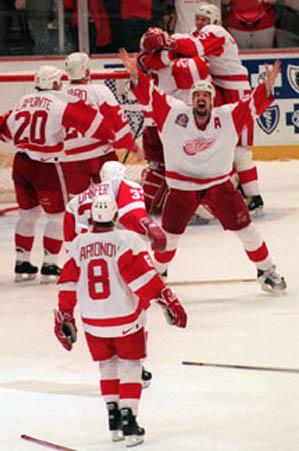 steamrolled
over Philadelphia for the championship. The subtle steamrolled
over Philadelphia for the championship. The subtle
irony came in a line from
that song, one that no one could know
would prove hauntingly prophetic,
"We'll be standing on top of
the world, for a little
while." No one knew just how little that
blessed while would be--that
in fact the elation of victory would
be deflated only six days
later.
But at the time no one thought
twice about it, and why
should they have?
The last time the Red Wings won the Stanley
Cup, the most treasured
trophy in sports, Eisenhower was in the
White House, the Dodgers
were in Brooklyn, and rock n' roll was
in its infancy. Of
course, this championship drought was
supposed to have emphatically
ended one or two years ago, when
the Red Wings appeared to
have a more formidable team. But now
no one seemed to mind; in
fact, the failures of recent years made
1955 seem even longer ago.
Hockey tradition has it that
the captain of the winning team
first receives the Stanley
Cup, and this year no Red Wing
deserved this honor more
than captain Steve Yzerman. The city of
Detroit is known for its
quiet superstars, housing Barry Sanders
and Grant Hill, but before
either of them came to the Motor City,
there was Steve Yzerman.
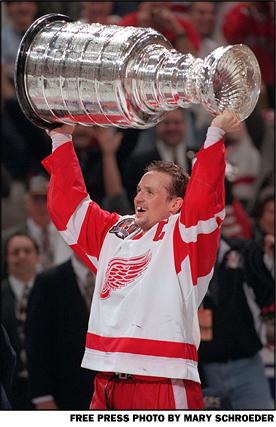 Yzerman
joined the Wings 13 years ago, the season before the Yzerman
joined the Wings 13 years ago, the season before the
Tigers won baseball's World
Series, Detroit's last championship.
That's the longest stint
with one team of any active hockey
player, nearly twice as
long as any other Red Wing. And playing
for a perennial power in
hockey has not been easy, not when such
a power is rendered pathetic
year in the playoffs each year.
There had been trade rumors
and rifts with coaches, but the
playoff losses were the
worst--in this decade two first round
upsets, an Stanley Cup Finals
sweep at the hands of underdog New
Jersey, and a bouncing out
in the conference finals last year
after setting a record for
most regular season wins ever.
Through it all Yzerman has
maintained a quiet dignity, polite and
straightforward, avoiding
the ego-driven antics of other
dissatisfied stars.
So when Steve Yzerman hoisted
the 35-pound Stanley Cup above
his head--"heavy, but kind
of light, too," coach Scotty Bowman
would say--no one was expecting
the bug-eyed grins and wild
shaking of the trophy of
previous winning captains, just an
overwhelming sensation of
satisfaction, years and tears in the
coming. You didn't
have to be a Detroit Red Wings fan, you
didn't have to be a hockey
fan, to know that this is what sports
is all about, this is what
kids still dream of when they go to
bed at night, this is the
kind of rare moment that maintains an
sense of purity amid a senseless
and money-crazed sports world.
Rivaling Yzerman's stoicism
if not his desperation was
Scotty Bowman, the uncharacteristic,
sometimes aloof, yet highly
successful coach of the
Red Wings. While Yzerman sought his
first Stanley Cup, Bowman
was in search of his eighth, the one
that would make him the
first coach to win with three different
teams. But despite
the unprecedented history he wrote in years
past, he knew this chapter
would be a defining one, that he would
have to win in Detroit to
prove that he was not just a legend; he
was still a good hockey
coach. Many doubted this as Detroit
fumbled golden playoff opportunities
and a handful of Red Wings
regulars were traded, alienated
by Bowman in a confrontation of
personalities. Even
as Bowman was wrapping up his 1,000th career
victory this season, the
first and probably last ever to reach
that mark, the questions
remained.
But the person who probably
cared least was Bowman himself.
The phrase laid back doesn't
do justice to his perpetual
nonchalance. One sportswriter
once described former Toronto Blue
Jays manager Cito Gaston
as auditioning for a spot on Mount
Rushmore; Bowman provided
stiff (literally) competition. Maybe
he had just seen too many
games over the course of his great
career to be fazed by any
win or loss--indeed, his face provided
a poor scoreboard.
After an especially thrilling game-winning
overtime goal in the second
round of this year's playoffs, an
assistant coach tried to
celebrate, raising his arms and
eyebrows, only to turn to
the staid Bowman, seemingly preoccupied
with postgame transportation
arrangements, in any event unmoved
by the bedlam unfolding
around him. 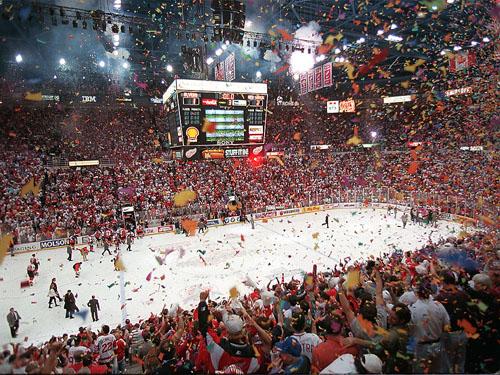
So the most unlikely celebration
at Joe Louis Arena that
championship night in June
came in the form of Bowman, lacing up
ice skates after the game
and joining his players for a victory
lap on the ice, wearing
a broad smile most assumed he had long
packed away in an attic
somewhere--unusual for any coach, but
especially the indifferent
Bowman. This was his eighth, but he
carried it as though it
were as new to him as it was to the long-
suffering fans of Detroit.
They all hoisted the Cup
before the night was over--Brendan
Shanahan, brought in at
the start of the season to provide much-
needed brawn; Sergei Federov,
this year silencing critics of his
previous playoff disappearances;
Darren McCarty, who scored the
game-winning goal in the
decisive game in highlight reel fashion
despite his preference for
fighting, not offense.
 They
celebrated that night; then, two days later, they They
celebrated that night; then, two days later, they
celebrated all over again,
this time in downtown Detroit, bathed
in the afternoon sun.
Parents pulled their kids from school,
eyeing a more memorable
education that day, and crowds swelled to
estimates of one million
people. Somewhere amid the throbbing
throng was the vehicle housing
Steve Yzerman and the Stanley Cup,
which he periodically raised
for the jubilant masses. On this
day a theme transcending
sports was unmistakable--this is more
than a hockey club; it's
the heartbeat of an entire city. While
unity for urban betterment
seems utopian in such a diverse, vast
metropolitan area, the simplicity
of sports accomplishes what the
seemingly more meaningful
cannot--bring thousands of people
together to rally around
one common cause. And nothing magnetizes
them like a championship,
especially one decades in the making.
This urban unity and identity
through sports is largely lost
in the American sports scene
today. Stars come and go like
unsuccessful politicians,
tossed around by the towering waves of
millions of dollars.
Now most athletes fall short of the once
effortless accomplishment
of heroism; they're only expensive
icons on whom a jersey with
a city's name seems inappropriate for
its temporary status and
high price. That's the difference
Detroit realized that day--Yzerman,
captain of the only team he's
ever played for, and played
for over a decade, actually worthy to
be at the center of all
this attention, the epitome of what an
athlete should be these
days, and the rest of the team, assembled
not primarily by money but
by the consuming cause of finally
winning a championship for
the city affectionately known as
"Hockeytown."
But if the elation of victory
transcended sports, so did the
stunning tragedy of days
later. They had waited 42 years; now
the celebration would quiet
down after not even one week. The
teams two Russian defensemen,
Vladmir Konstantinov and Slava
Fetisov, left a team gathering
with team trainer Sergei
Mnatsakanov, in one of the
limos arranged by the team in
anticipation of alcohol
consumption by the players. Taking this
safety precaution, however,
placed the players in another form of
danger--the driver for these
three had his license revoked a year
ago after 11 traffic violations,
including driving under the
influence, in just six years.
Shortly after 9:00 that Friday
night he swerved off the
road and collided with a tree,
reportedly after falling
asleep at the wheel. Konstantinov and
Mnatsakanov were left unconscious,
Fetisov injured but released
from the hospital days later.
No one ushered any of the
Red Wings from the intensive care
unit despite a family-only
policy--the team had already seemed a
family, now more than ever.
It was the captain Yzerman, no more
immersed in celebration,
now subdued by the severity of this
event, asking in a faltering
voice for the prayers of Detroit for
Konstantinov and Mnatsakanov,
both in a coma.
If the mood of Detroit had
seemed something surpassing
sports after the thrilling
Stanley Cup win, now it was equally
extraordinary, though drastically
different. Again events
rendered petty the supposed
importance of hockey, a game played,
as now lives lived hung
in the balance. It no longer mattered
that Konstantinov was a
star defenseman, a finalist for the
Norris Trophy as best blueliner,
an intense player other teams
accused of playing dirty,
seen by his team as essential. The ice
was a million miles away,
as the sport of life took center stage,
crippling player and trainer
with equal regard. Hockey seemed a
game again, the championship
drained of its sweetness, now a
distant memory.
Fetisov will probably make
a full recovery with relative
ease; Konstantinov and Mnatsakanov
gradually regain consciousness
and ability but remain in
serious condition. Continuation of
their careers is unlikely
but not even in the forefront of
consideration by the doctors
or the team--the only concern is for
them to walk again and live
with as much normalcy as possible.
So in just one week the city
of Detroit and its team rode a
roller coaster covering
the peak of sports accomplishment and the
impeachment of its importance.
Meanwhile the Red Wings will
maintain their champion
status at least until next June; their
names will be inscribed
on the Stanley Cup with all the champions
of years past. 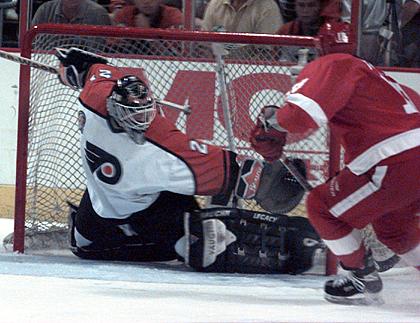 But
they will be somewhat distracted next year, But
they will be somewhat distracted next year,
and healthily so.
After a journey of 42 years in which the goal
of winning seemed of unmatched
importance, a tragedy shaped the
focus of a city and an out-of-proportion
sports world. It is an
opponent that cannot be
defeated as other hockey teams by stellar
play on an expanse of ice.
Now the song played on championship
night hits home; "standing
on top of the world" is no longer a
chief concern, not with
the abrupt end of such "a little while."
Now the Stanley Cup, sought
religiously for so long, is just a
trophy again.
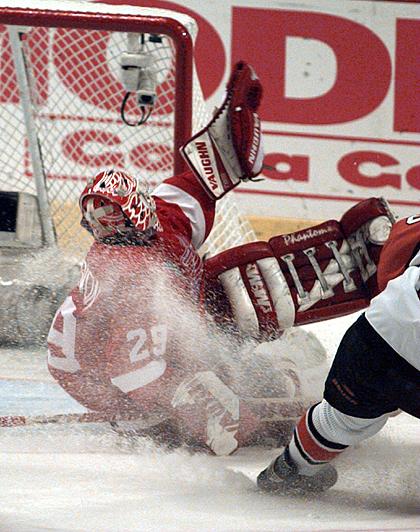 The
sports world is too often an inattentive student in the The
sports world is too often an inattentive student in the
classroom of life, gazing
out the window at irrelevant fun and
games or the pretty girl
of pecuniary prosperity obstructing the
teacher. If it bypasses
this lesson its graduation to sensible
priorities looms as distant
as ever. Detroit has learned,
unwillingly and painfully.
It hopes its being shaken to the core
eliminates the need for
others to learn with such debilitating
drama, but it knows with
equal conviction that this lesson in
life disregards any student's
volition.
 

The Summer of 1997 in Sports
Hockey: Triumph and Tragedy
Basketball:
One for the ages, again
Boxing:
Dismemberment and disgrace
Golf:
Two tough to take |


 steamrolled
over Philadelphia for the championship. The subtle
steamrolled
over Philadelphia for the championship. The subtle

